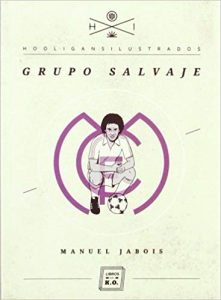Once you Manuel Jabois It is already lavishing more in the field of literary fiction, its narrative incursions have awakened that claim effect that every good writer achieves in the process of transformation from the columnist, chronicler or essayist to the storyteller.
Of course, things always come from afar. The thing about starting to tell stories in someone "of letters" like Jabois takes root in other times in which even his own experiences are being fictionalized, like any neighbor's son who has a passion for letters. But it is now, with the passing of the years, when the writer has called with greater intensity, like the replica of an old earthquake, of a literary restlessness that is taking the best of roads.
But beyond narrative orientations in one or the other spaces. What is important for us readers is that the good omens are materializing. And it is that what is relevant is that careful interest in the intrahistories that make up reality from different, peripheral foci, where the light barely reaches. There where only the writer is able to rescue what is essential to make good literature.
Top 3 recommended books by Manuel Jabois
Miss mars
I have to confess that once I hooked up with Miss sympathy from Soria. I think it was the summer of '93, like the time this novel starts. The point is that I did not know more about her or rather she did not want to know more about me. It can be said, as Matías Prats himself would sign, that he was not amused.
Something as atypical and even exotic in its statement as is this Miss Mars from Manuel Jabois. But it is that we live atypical times, disconnected from one day to the next. Miss Mars anticipates strange events, alienated but alien. Although if we think about it, we have all felt a bit Martian, misplaced according to what paths of our destiny ...
And that the approach of this novel is not that it is something so anomalous from the start. Everyone has the right to new opportunities, to rebuild their lives, to look back without becoming a pillar of salt. The problem is whether being Miss Mars in itself means that everything is always strange.
"Is it true that you are Miss Mars?"
"Yes, there is another canon there."
1993. Mai, a very young girl with a two-year-old girl, arrives in a coastal town turning everything upside down. He immediately makes friends, meets Santi, they fall in love instantly and after a year they celebrate a wedding that ends in tragedy, when on the night of the party Mai's daughter mysteriously disappears.
2019. The journalist Berta Soneira is preparing to shoot a documentary about the event that occurred twenty-five years ago. To do this, he interviews everyone who still remembers him, rewriting the story of a day that changed everyone's life.
weed
The simple intention of addressing the most peremptory truths about the magical and the tragic always augurs an emotional depth in the midst of any action.
And there is certainly action in this novel. Always around the lives of the children Tambu and Elvis. And around them the paradoxical and the strange, from the overflowing imagination of childhood serves the whole of that balance, between childhood concerns and the natural orientation to the fantastic. The fantastic of a world to discover and the harshness with which that world can strive to undo the days of childhood like a light mist.
He has also lost his father in the most tragic way. At ten years of age, it is difficult to imagine how such an impact can fit into a child's life. But what we can guess from this story is that childhood paradise continues to claim its space, complicated as it may seem. Denial is a phase of the human being in the face of the tragic. But in the state of childhood that denial is the most natural and continuous response. Only, in addition, with the lack of a father on many occasions a North is lost.
And it is intended to reach new forced paradises since that imposition of the end of childhood. Between Tambu, his sister Rebe and Elvis, we dealt with relationships that were not always easy in an improvised family after the first two were orphaned. And we enjoy that idea of the first time of almost everything, of discoveries and the naive sense of infinity of moments that only has a place in childhood.
Only that reality runs parallel, with its fateful becoming determined to write the boys' own destiny. There is much of the author's particular symbolism in the story, probably nods to his own past. But when the particular universe is exposed with the frankness of this story, that general impression of the human about guilt, about fears, about the idea of the fragile and the only possible formula of looking forward to survive ourselves is reached. .
mirafiori
Love as a necessary self-sacrifice when one no longer exists by itself. The arrival to the extreme of life, to the open air of the soul, where nudity can end up manifesting and healing wounds or drag forever to the loss of reason.
«If one is truly in love, even in the freest and wildest and most modern souls, most sure of themselves, the ancient world beats inside and its old clock of primal instincts, among them the most important of all: the survival of the couple, the fear of losing them».
What would you do if the woman you are in love with confides in you that she sees ghosts? Valentina Barreiro and the narrator of this story met as teenagers and have shared a secret all their lives. When he is over forty, Valentina is a successful actress and he is a heartbroken man without fortune. A man who only loves her as he can. Only then, when it's too late, will they really get to know each other. This is a story about the beauty of everything that has no explanation. A novel about the difficulty and emotion of not being able to understand everything that happens to us.
Other recommended books by Manuel Jabois…
See you in this life or the next
Gabriel Montoya Vidal or the journalistic intensity of the peripheral character in whom the human vein ends up being discovered. Because the aforementioned protagonist is a minor devoted to the cause of inertia towards perdition. The story of an internalized nihilism until culminating in a kind of indifferent hatred. Black on white in this book without evaluations or interpretations of the author, a master class in that journalism that presents the crudest facts for everyone's digestion.
The truth is that it is not easily digested. There is no possible empathy with a Gabriel capable of offering himself for the cause of the greatest attack suffered in Spain. Neither because of his childhood nor because of his lack of horizons nor because of the obfuscation of his use as a mere tool for evil. When a question is raised, why is it done? and the answer turns out to be more sinisterly illuminating than how to do it? without a doubt, the nature of the person who must answer the questions is oriented towards an abyss of doom and hopelessness that leads to animosity. And those who rescued him from his miserable life to redirect him towards the worst knew perfectly well where to find pawns like him.
The Wild Bunch
Soccer and literature. How could both aspects not be united. The fusion is served on this occasion from a different Madridismo, the one professed by Manuel Jabois who structures it around experiences, details, goals, victories and defeats and his anecdotes and parallel feelings.
And in the end, although it sounds paradoxical, neither is his madridismo so different from that of others, but rather narrated from a subjectivity more than satisfying the taste of any football fan. Because beyond wanting some colors, football is experiences, memories that make one think that the old ones for soccer players. Those guys with their lustrous Viking warrior mustaches and manes (whoever could), always looking for some loot.
Although in the end it may also be a matter of the idealization of the years of so much childhood attached to the beautiful sport in Spain. Those warriors may not even eat a piece of bread now, with so much preparation, so much tactics and so much therapeutic diet. But the epic serves the cause, it must be a transmission belt from parents to children (in the event that both like soccer), so that the fans continue to build special moments beyond the trivialities of life.






1 comment on «The 3 best books of Manuel Jabois»